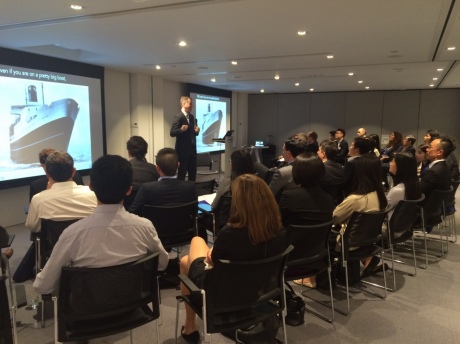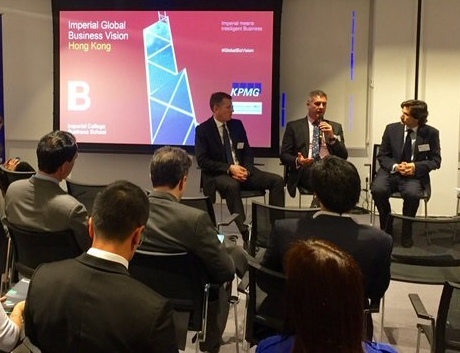'Make big data small enough' say experts at Hong Kong event

We need new techniques in analytics and visualisation to make sense of big data, according to a key speaker at a major event in Hong Kong this week.
Imperial College Business School and KPMG joined forces to share their data expertise at a two part event aimed at helping businesses get value from and better understand their data.
“One of the big challenges we’re now seeing is that data sets are getting bigger, but our brains are not.
– Dr Mark Kennedy
Director of the Centre for Advanced Business Analytics, Imperial College Business School
Addressing an audience of finance and human resources professionals, Dr Mark Kennedy, Director of the KPMG Centre for Advanced Business Analytics at Imperial College Business School, said: “One of the big challenges we’re now seeing is that data sets are getting bigger, but our brains are not. So data sets are evolving in size and complexity, propelling techniques in business analytics to increasingly exotic methods, but the cognitive capacities of human decision makers are not changing at all.
“This means we need to look for techniques in analytics and visualisation that make big data small enough for people to take new insights on board and act on them.”
The event followed the launch of the KPMG Data Observatory earlier this month - an enveloping wall of 64 monitors with 313 degrees of surround vision, allowing people to visualise everything from cryptocurrency transactions to migration patterns.

Dr Mark Kennedy leads the discussion on data at the event in Hong Kong
James McKeogh, Partner in KPMG China, said: “We were happy to host this event in partnership with Imperial College Business School. It provided an opportunity to showcase both KPMG’s and Imperial’s technology and knowledge on how big data can be applied in human resources management and to financial institutions. Through this event, we also achieved a better understanding about challenges for industry, which is crucial to develop our rapidly growing analytic business.”
Leading with data in HR
The morning session, which was supported by the Financial Times | IE Corporate Learning Alliance, focused on the opportunity data presents to transform how human resources departments operate. Panellists agreed that while the use of data in human resources is still in its early stages, it is likely to play a bigger role in this area in the future.
The event also examined the opportunities that executive education presents to businesses to bridge the gap between ideas and human behaviour. Attendees were also able try out the Performance Simulator, part of Imperial College Business School’s Executive Education Impact Lab™, which offers experimental and experiential learning experiences.
Gull Gumbrell, Head of Custom Programmes, Executive Education, at Imperial College Business School said: “When you come to a world class business school you expect to get thought leadership and stimulating ideas. But the real value for individual and organisation is to move from idea to changed behaviour and so to new levels of performance. The Impact Lab approach to executive development aims to provide new ideas and new experiences as well as the support to apply those ideas back into your work environment.”
Leading with data in financial institutions
The event concluded with an evening discussion, which looked at the importance of explaining data in simple language to enable businesses to make more sound commercial decisions.
Guests were also able to see new research from the Business School in the visualisation of financial data and how this can be used to spot trends within large, complex data sets.

A panel discussion about data in HR and finance
Professor G 'Anand' Anandalingam, Dean of Imperial College Business School said: “The Global Business Vision events in Hong Kong further emphasise our dedication to bringing the worlds of business and data science closer together. Through our collaboration with KPMG we strive to find innovative solutions to the issues of handling complex data sets and events such as this are an opportunity to share our expertise so that business leaders around the globe can better understand and create value from their data.”
The event forms part of the Business School’s Big Data Month, which continues with an Imperial Business Insights talk on 26 November, ‘Towards a data driven marketing profession’ featuring guest speaker Caroline Taylor, Vice President Marketing, Communications & Citizenship and Chief Marketing Officer for IBM Europe. Further information is available on the Business School's website.
Article text (excluding photos or graphics) © Imperial College London.
Photos and graphics subject to third party copyright used with permission or © Imperial College London.
Reporter
Press Office
Communications and Public Affairs
- Email: press.office@imperial.ac.uk
